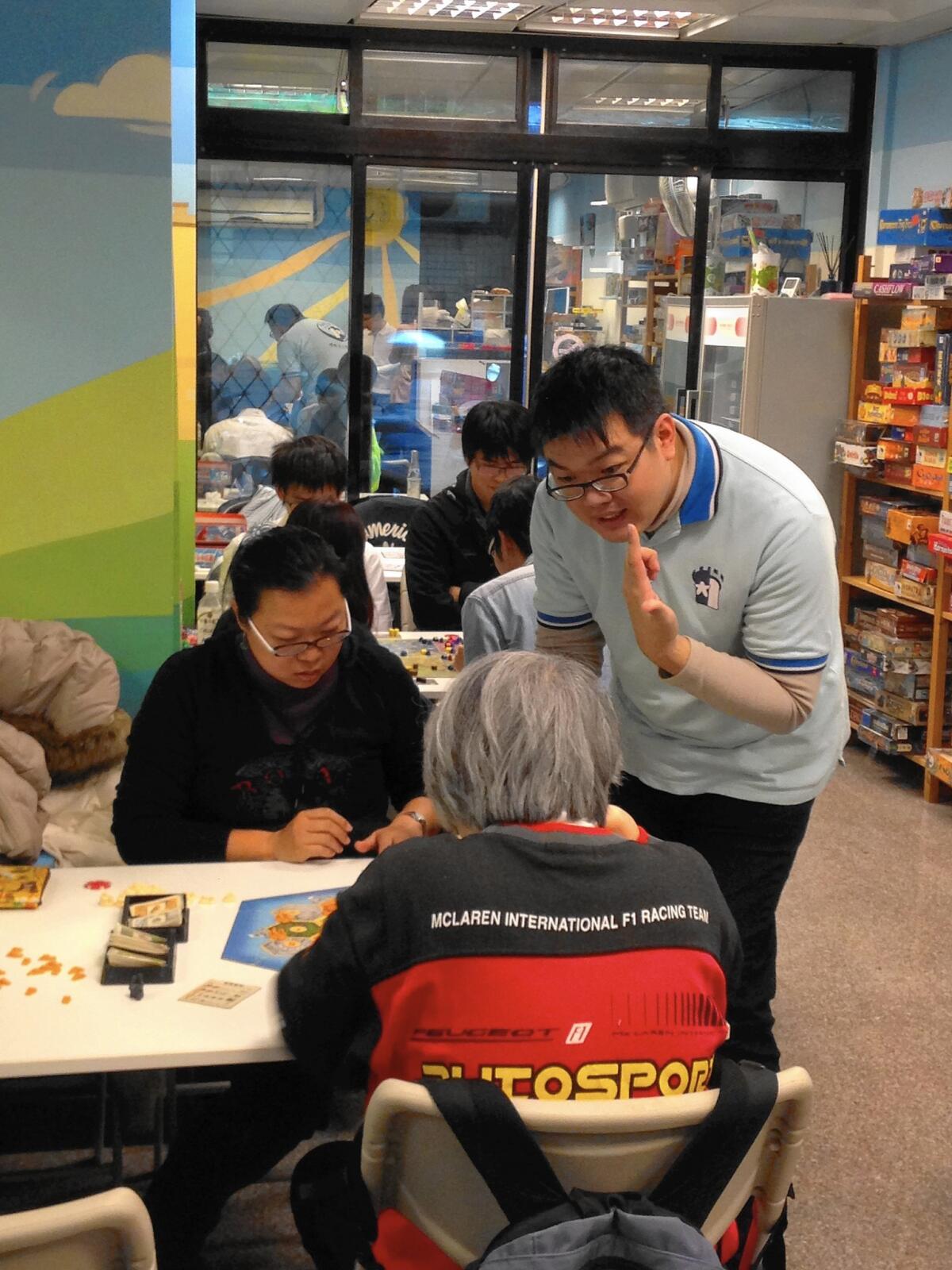In Taiwan, board-game parlors are the new nondigital thing

Like most people in Taiwan, Chang Jui-cheng has a smartphone with access to games such as Candy Crush and Zombie Tsunami. But on a recent Saturday, the 24-year-old graduate student spent three hours playing old-fashioned board games, and actually paid for the low-tech experience.
He’s no retro weirdo. About 50 game parlors and cafes have opened in greater Taipei in the last five years, with at least 50 elsewhere in Taiwan. Customers such as Chang pack them on weekends, often into the night.
Public game rooms give overworked and, in many cases, shy people a venue to meet friends and acquaintances, and provide them with a central activity that brings cheers and taunts, reveals secret talents and otherwise stokes conversation without the pressure of grasping for topics of common interest.
“You can interact directly with your friends. Everyone is at leisure and chatting,” Chang said after finishing a round of a card-based strategy game, The Message, with five friends at a crowded parlor in Taipei. It was his fourth trip to a board-game room. “If you play on your cellphone, not necessarily so many people can participate.”
The trend started around 2008, when a local publisher released Chinese-language versions of numerous games, including Citadels, a character-building card game that tests skills in bluffing and diplomacy. University students and recent graduates in Taipei became enthused and started bringing a wider group into the fold. Exhibits on board games at the annual Taipei International Book Exhibition have gradually raised awareness as well, parlor operators say.
Taiwanese players usually go for Western strategy games such as Seasons and easier ones, including Halli Galli and Tiki Topple. Few are invented in Taiwan.
The trend has also dovetailed with teachers’ increasing in-class use of games such as Scrabble for English, and number games for math, said Lo Hsiao-chai, who blogs about games and claims to have played 3,000 different ones. Some parents steer their school-age children toward board games to prevent them from becoming obsessed with electronic ones, said Lo, whose blog offers Chinese translations for the many boards, cards and instructions available only in English.
Cacacity is a game-room chain with seven parlors in Taipei. At one branch, manager Lo Kuei-hua shows customers how to play whatever they choose from his stock of 200 games, such as Dixit, Rhino Hero and Rory’s Story Cubes.
“They want games that are not too complex, games that let you tease and laugh and simulate enacting something onstage,” he said. His branch, tucked away in a narrow residential alley, can seat 25 people and fills on weekends.
Bursts of laughter and animated debates about game rules break longer bouts of concentration in the brightly lighted, classroom-size parlor with cartoon images of outdoor scenery painted on the walls. The game shelves are three levels high and a refrigerator of drinks stands by the door.
Game parlors usually charge $1 to $2 an hour per person, which includes a soda and use of any game on the shelf, a much cheaper outing than, say, karaoke. Some are open past midnight, and sell food or even the games themselves.
“After shopping and karaoke, this can be classified as a new type of entertainment, which is not expensive, and you can interact with friends and pass a lot of leisure time,” says Yeh Li-jia, co-owner of a parlor called Baker Street. About 50 people can cram into her parlor and might sit up to five hours testing their luck in Camel Up or wealth accumulation skills in the strategy game Splendor.
In Taiwan, 59% of people 12 and older have smartphones, according to a research center under the government-backed Institute for Information Industry. On Taipei’s buses and commuter trains, easily half the passengers alternate between online chats and games on smartphones or computer tablets. And once at work, many people are stuck in front of computers all day.
“When you work facing a computer, that’s even more stifling,” says Peng Yu-jing, owner of the Witch House restaurant, where up to 80 people at one time can eat, drink, listen to live music and play games. She was ahead of the curve, introducing the games in 2002. “Those things are just machines, and machines aren’t your friends.”
Games may eventually move into private spaces. Some players have turned to the 6-year-old Taipei-based Jool Boardgame Club, which has its own venue plus a website where it maintains a bulletin board and auctions off game sets. Eventually gamers may just buy sets to take home, and play room operators already keep some games unopened for sale.
“Players of course will get their own games,” says Chung Da, 23, a recent college graduate from Taipei. “The game parlors are a place where players can play a lot of games and don’t have to buy them.”
Jennings is a special correspondent.
More to Read
Start your day right
Sign up for Essential California for news, features and recommendations from the L.A. Times and beyond in your inbox six days a week.
You may occasionally receive promotional content from the Los Angeles Times.






